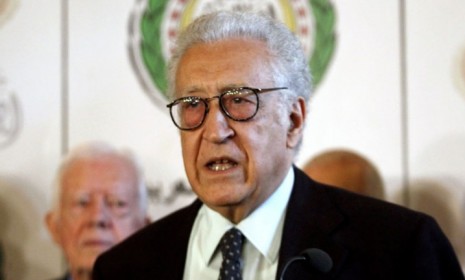3 ways the Syria ceasefire could go wrong
The U.N.'s peace envoy says Syria's warring sides have agreed to stop fighting during Islam's Eid al-Adha holiday. Will the truce happen — and would it do any good?

A free daily email with the biggest news stories of the day – and the best features from TheWeek.com
You are now subscribed
Your newsletter sign-up was successful
United Nations-Arab League envoy Lakhdar Brahimi raised hopes for a break from the bloodshed in Syria on Wednesday, when he announced that the Syrian government and most rebel groups had agreed to a four-day ceasefire this weekend to mark the main Muslim holiday of the year. "If this humble initiative succeeds, we hope that we can build on it," Brahimi said. It remained unclear who would respect the temporary truce. The Syrian government said its military was still studying Brahimi's proposal and wouldn't say until Thursday whether it would honor the plan. Several opposition leaders said they didn't trust the government of President Bashar al-Assad to suspend its attacks, and al Qaeda-linked Islamist militants said there would "be no truce between us and the prideful regime and shedder of the blood of Muslims." Could the ceasfire advance Brahimi's push for peace, or could it backfire? Here, three ways it could go wrong:
1. It will give Assad a chance to regroup
The Assad regime is only going along with the plan to "buy time," Free Syrian Army spokesman Louai Miqdad tells CNN. Rebel fighters have been making gains in the last few weeks, so Assad wants to take advantage of the truce to give his forces a break and send reinforcements. Then, once the four days are up and the ceasefire ends, they'll charge in and try to wipe out the opposition.
The Week
Escape your echo chamber. Get the facts behind the news, plus analysis from multiple perspectives.

Sign up for The Week's Free Newsletters
From our morning news briefing to a weekly Good News Newsletter, get the best of The Week delivered directly to your inbox.
From our morning news briefing to a weekly Good News Newsletter, get the best of The Week delivered directly to your inbox.
2. This just prolongs false hope
On the plus side, "any lull in the fighting would allow critically needed aid to reach some of the estimated 2 million displaced civilians in Syria," says Rick Moran at The American Thinker. That won't help resolve the crisis, though. Only "clear American leadership" can do that, so the truce will wind up being just "one more futile gesture" allowing the Obama administration to stand idly by and pretend the international community is working toward ending the bloodshed.
3. The truce will unravel and spark new attacks
This "rare glimmer of good news" is welcome, says Jon Leyne at BBC, but don't get your hopes up. It won't even happen if the army doesn't sign on. Also, "only some of the rebel groups are on board," and there are so many different rebel factions that "it may be impossible" to get them all to stop shooting, even for a few days. Brahimi certainly has no way of enforcing or even verifying that anyone's complying, say Michael Peel and Abigail Fielding-Smith at the Financial Times. The U.N. pulled out its observers over the summer after the first ceasefire, mediated by Brahimi's predecessor, Kofi Annan, fell apart. When that truce broke down, both sides pointed fingers and the whole exercise was only followed by an escalation of the violence.
A free daily email with the biggest news stories of the day – and the best features from TheWeek.com
-
 Political cartoons for February 21
Political cartoons for February 21Cartoons Saturday’s political cartoons include consequences, secrets, and more
-
 Crisis in Cuba: a ‘golden opportunity’ for Washington?
Crisis in Cuba: a ‘golden opportunity’ for Washington?Talking Point The Trump administration is applying the pressure, and with Latin America swinging to the right, Havana is becoming more ‘politically isolated’
-
 5 thoroughly redacted cartoons about Pam Bondi protecting predators
5 thoroughly redacted cartoons about Pam Bondi protecting predatorsCartoons Artists take on the real victim, types of protection, and more